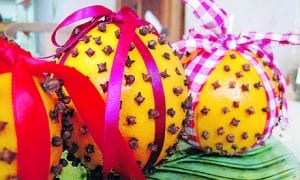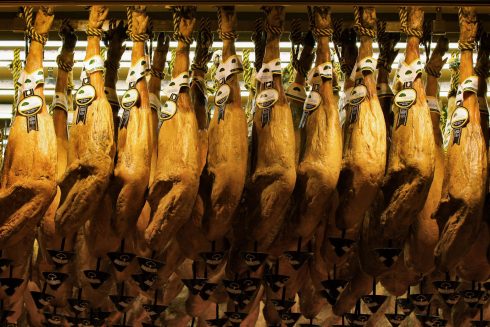By Eloise Horsfield
WITH all those unwanted gifts, piles of wrapping paper, naff plastic toys from crackers and inevitable over-consumption, Christmas has the potential to be a tremendously wasteful time of year.
Thankfully there are ways of minimising your carbon footprint during the festive period – and an obvious starting point is what goes in your belly during the season of merriment.
“An eco-friendly Christmas is one where you buy local produce and local ingredients,” says Scarlett Farrow, who runs a guesthouse in the Lecrin Valley based on the permaculture cycle.
“This means getting used to the idea that, being abroad, you might not be able to make a Christmas meal exactly like at home,” she says. “But this doesn’t mean it won’t be as good. It’s still possible to have a great Christmas buying food produced in Spain.”
Opt for old-fashioned markets over supermarkets so your food purchases come in minimal packaging, and choose local produce over that which has been transported thousands of miles from source to plate.
When choosing the all-important wine for your Christmas lunch, consider organic and sustainable producers such as Enkvist in Gaucin, Ronda’s Martin Kieninger or Friedrich Schatz, or Bodegas Robles in Cordoba.
Food leftovers are often associated with Christmas, but when they end up in a landfill they rot and release methane, a gas which can be 20 times more harmful than carbon dioxide.
“Avoid the pressure to buy loads of food,” says Martin Hyams from Almeria-based green collective Sunseed, who points out that overbuying and eating to excess actually has nothing to do with the traditional Christmas.
“It’s a historical festival,” he says. “It used to be that people were celebrating the winter solstice, so rejoicing in the fact they were still alive halfway through the cold winter, that the days would soon be getting longer and that they’d soon be able to plant the harvest for the following spring.
“It’s about harking back to simpler times. Even if you are religious, think about how Jesus would have been living – because after all, Christmas is a celebration of his birthday. He led a simple life, encouraging community spirit and camaraderie.”
Jesus led a simple life, encouraging community spirit and camaraderie
As for presents, Martin prefers those that show thoughtfulness and generosity of time rather than being money-orientated.
Nobody wants a reputation as a Scrooge, but consider this – last year an eBay survey found that 46 per cent of Spaniards received a present they didn’t want, with hundreds of thousands of them ending up on the bidding site by the end of Christmas night. And it’s estimated that many of those came from in-laws, uncles and aunts.
Interestingly, the Spaniards are among the highest spending parents in Europe this Christmas, with 40 per cent planning to invest more than 100 euros per child. Quite incredible for a country in the middle of a recession!
“A lot of people get carried away with the consumer side of Christmas, which really has nothing to do with it,” says Martin.
“I think money often displaces real feelings. It is far more generous to give gifts in terms of time and show you have put passion into something.”
Another way of avoiding consumer and throwaway culture is by getting your friends gift vouchers, for example for the cinema or iTunes, to enable the receiver to tailor the present to their own tastes.
Experience-based presents are another option, and these don’t have to be boring – surprise a relative with a day of rock climbing or paragliding, a gym subscription or tickets to see a show.
If you must give wrapped-up presents, how about making some? You could try your hand at creating jars of jam, chilli oil, pickled garlic or chutney – or fill empty biscuit tins from last year with rum truffles or freshly-baked cakes.
Plus, there are plenty of eco-friendly presents available in Andalucia. In Grazalema and Gaucin you can buy hand-crafted pure wool blankets, and the woman’s cooperative in Igualeja near Ronda makes all sorts of products woven from local esparto grass including mats, hats and bags.
Come Boxing Day, if you have been lumbered with an unwanted present, donate it to charity so it can be useful to somebody else. You’ll find shops for cancer hospice Cudeca all over Malaga province, for example in Alhaurin, Alora, Arroyo de la Miel and Coin. Aspandem, the charity for people with disabilities, has a branch in San Pedro and ADANA animal shelter has a shop in Estepona.
Next up, recycling. Sort your rubbish into glass, paper/card, and food containers, and make use of the recycling bins at your disposal all across Andalucia.
Forget wrapping paper – instead use newspapers and magazines to cover presents and tie them up with a piece of red ribbon. Re-use wrapping paper you receive presents in, and turn this year’s greetings cards into next year’s gift tags with some scissors. Attractive cards can be made by sticking autumn leaves onto recycled card.
Decorations are another potential post-Christmas pollutant. “So many Christmas ornaments are made of foil or plastic, but it’s better to make your own out of natural materials,” says Scarlett, who suggests spraying pine cones to make original baubles.
Another environmentally-friendly idea is to make sweet-smelling pomanders from oranges and cloves (see below).
The key to making sure your Christmas is as green as can be is thinking ahead and making sure what you eat, give and enjoy does not cost the planet dearly in terms of travelling or discarding. Leaving it to the last minute is bound to result in hasty, thoughtless and therefore potentially wasteful purchases.
“It’s about using imagination and time,” concludes Scarlett. “Oh and one last thing – leave the car at home and get outside to explore your local green spaces this Christmas.”

How to make pomanders
You will need: Oranges, ribbon, pins, cloves and a skewer or toothpick
1. Pin two pieces of ribbon around each orange, crossing over each other at the bottom so they leave four quarter sections
2. Decorating one quarter at a time, use the skewer or toothpick to make the holes where the cloves will go
3. Gently push the cloves into the holes
4. Hang in doorways and on door handles and enjoy the Christmassy aroma








